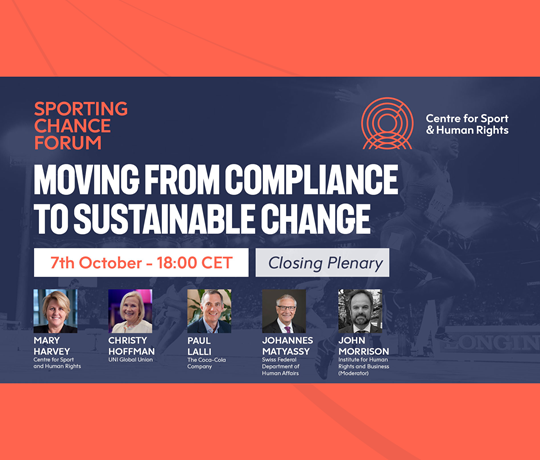Moving from Compliance to Sustainable Change
Session Summary
Change in sport – as in any walk of life - is hard, and when it comes to human rights there is much to grasp, but there is no time to lose. Most countries and many organisations globally continue to uncover human rights abuses linked to day-to-day sport and events. The issues are urgent and profound, ranging from climate change impacts on athletes, workers and fans, to the shrinking of civic space and constraints on freedom of expression, to the right to health amidst inequalities compounded by Covid-19, and challenges to ensure access to remedy for survivors of sexual abuse, there also continued concerns around unsafe working practices and lack of freedom of association. The Sporting Chance Forum highlighted practical examples and insights into how robust due diligence systems can help start to put things right.
A key shift that will enable sport to become a vehicle for positive impact on human rights is this gradual move beyond compliance that is now taking place. Leaders are starting to embrace responsible sport and ways of working that encompass the entire realm of human rights due diligence, with impacts on people at the core. Sport will only achieve its immense potential to support positive social change if it respects the human rights of all groups. By strengthening mechanisms for engagement and remedy, giving affected people, victims and survivors a place at the table, and making room for independent accountability it will be possible to drive change and progress beyond what compliance alone can achieve.
Sport continues to have a profound energising role in galvanising social justice and promoting gender equality. The past eighteen month has shown the influence of athletes in the arenas of climate activism and social justice, with professional athletes at the forefront of Black Lives Matter and anti-racism efforts, and women athletes fighting for equality and using their right of freedom of association and to strive to make gains. Sport and sporting heroes reach the broadest of audiences and can bring about behavioural change and social transformation in key areas, including climate action, complementing efforts in sport for development and peace, sports integrity and child safeguarding.
Responsible autonomy is an empowering and inspirational model for sport. Responsible autonomy is not about restraining sport organisations, but rather about a fundamental change of mindset, from a position where sport is at the centre of everything, to one where people are at the centre, and the first considerations in the decisions we take as event hosts and sport governing bodies is how our choices impact people locally and offshore. This culture change reinforces the integration of human rights due diligence in sports governance and event management, that is people-centric, and strengthens accountability to achieve sustainable change, so that the world of sport is not only free from harm itself but purpose-led and able to lead by example in other walks of life.
The approach taken by the Centre for Sport and Human Rights and the commitments and actions of its supporters, particularly in the Advisory Council, are having an impact. Important changes have already been accomplished and these positive shifts in culture and practice are hard to roll back. To embed and extend change will take continued leadership, continued sharing and cooperation between organisations in sport and enrolling more governments, sports bodies and other stakeholders in a “coalition of the willing” that is building a burgeoning sport and human rights movement.
The establishment of the Centre as a fully independent organisation, the appointment of an independent board and launch of the Centre’s strategy in 2021 mark the start of a new stage of the journey for all who believe in the power of sport for human development and to lead the way in implementing enduring positive change. The integration into the strategy of the fundamental rights of freedom of association and collective bargaining so-called “enabling rights” lay the foundations for eradicating poor labour practises and promoting gender and racial equality.
This year has been the first virtual Sporting Chance Forum but also the biggest so far. This underlines the importance of forums and networks like these to exchange good practice and look ahead to emerging challenges and ways to address them collectively, and ways to bring together a diversity of voices and stakeholders. The actors in the sports ecosystem are interconnected and have an opportunity to work together to reinforce and support each other’s efforts. There is a lot of room at this table, and the dialogue and work only gets better the more voices that are present.
Watch the full session here
Click here to watch the SCF21 sessions on demand on YouTube